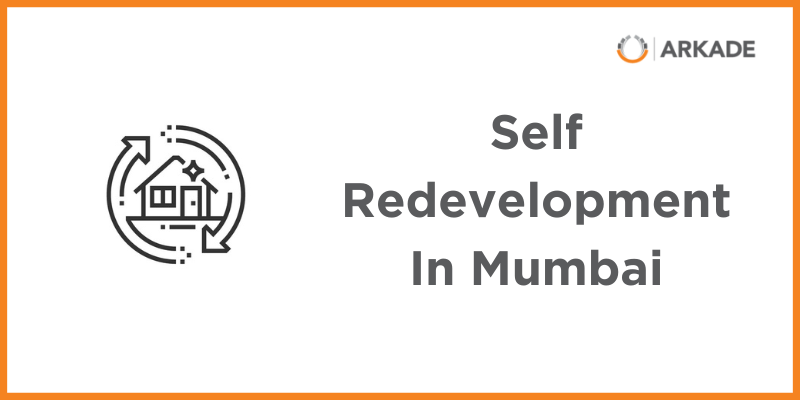Arkade Developers
Top Real Estate Builder and Developer in Mumbai

Self-Redevelopment in Mumbai: A Comprehensive Guide for Societies
Living in Mumbai often comes with the reality of aging buildings. While the city’s charm is undeniable, its older structures might not offer the modern amenities or safety standards you desire. This is where redevelopment comes in. This process empowers residents to transform their old society into a brand-new one, with the help of a developer.
An alternative to redevelopment is self-redevelopment. Self Redevelopment is a process in which residents of a housing society or community take on the task of redeveloping their property themselves, rather than relying on developers. This approach ensures that the interests of the existing residents are prioritized and maintains better control over the redevelopment process.
This blog serves as your one-stop guide to self-redevelopment in Mumbai. We’ll explore eligibility criteria, delve into the advantages and disadvantages, walk you through the step-by-step procedure, and even clarify the difference between redevelopment and self-redevelopment.
Eligibility Criteria for Self-Redevelopment
Here’s the good news: most housing societies in Mumbai are eligible for self-redevelopment. There are a few basic requirements:
- The society must be registered under the Maharashtra Cooperative Societies Act, 1960.
- A minimum of 66% of the members by share capital and 51% of members by occupancy need to approve the proposal.
- The building should be at least 30 years old (or deemed unfit for occupancy by a structural engineer).
- Society should hold clear land titles.
- Society must be financially stable to manage project costs.
Benefits of Self-Redevelopment in Mumbai
Self-redevelopment offers a huge amount of advantages for societies:
- Modern living: Imagine spacious apartments with modern amenities like gyms, swimming pools, and landscaped gardens. Self-redevelopment makes this dream a reality.
- Increased property value: A brand new building translates to a significant increase in property value for each member. This can be a great financial benefit.
- No displacement: Unlike traditional redevelopment, self-redevelopment allows you to stay put while the new building is constructed. You’ll move into your new, bigger apartment once the project is complete.
- Control over the process: Societies have complete control over the design, amenities, and selection of contractors, ensuring the project aligns with their vision.
- Profit Sharing: The society retains profits from selling additional saleable space.
- Transparency: Greater control over project execution and material selection.
Important Note: These benefits come with significant challenges, as explored further in the blog.
Disadvantages of Self-Redevelopment in Mumbai.
While attractive, self-redevelopment isn’t without its challenges:
- Time-consuming process: Obtaining approvals, managing finances, and navigating legalities can be a lengthy process, requiring patience and commitment from all members.
- Unanimity among members: Achieving 66% approval can be difficult, especially if there are disagreements about design or financial aspects.
- Financial burden: While there are government incentives, self-redevelopment can involve significant financial outlays for society. Delays can escalate costs.
- Expertise Gap: Securing approvals, managing finances, and construction expertise can be overwhelming for residents.
- Decision-Making: Reaching consensus among a large group can be time-consuming and lead to disagreements.
- Dispute Resolution: Anticipate potential conflicts and establish a clear dispute resolution mechanism within the society.
Self-Redevelopment Procedure in Mumbai
The self-redevelopment process in Mumbai can be broadly broken down into these steps:
- Feasibility study: A professional architect or consultant evaluates the project’s feasibility, taking into account factors such as FSI (Floor Space Index) and available finances.
- Member approval: The society holds meetings to discuss the feasibility study and obtain the required majority approval.
- Appointing professionals: Architects, engineers, and legal advisors are brought on board to handle the design, approvals, and legalities.
- Approval process: The society submits plans to get approvals from various authorities like BMC (Brihanmumbai Municipal Corporation), TMC (Thane Municipal Corporation), NMMC (Navi-Mumbai Municipal Corporation), etc..
- Financial planning: Societies need to explore options like bank loans or internal member contributions to finance the project.
- Construction phase: Once approvals and finances are in place, construction begins with close monitoring by the society.
Redevelopment vs Self-Redevelopment
On the other hand, Self-redevelopment puts you in complete control of design and profits but requires a significant time investment from members to navigate approvals, and manage construction, and Finances.
Redeveloping your home with a Real Estate Developer:
Advantages:
- Expertise & Experience: Reputed builders like Arkade bring proven expertise in project management, construction, and approvals.
- Financial Strength: Builders can leverage their financial resources to expedite the project and minimize delays.
- Reduced Time Commitment: Societies can focus on core functions while the builder handles project execution.
Disadvantages:
- Profit Sharing: Profits from additional saleable space are shared with the builder.
- Limited Customization: Societies may have less control over the design and amenities offered.
Taking the First Step
Self-redevelopment can be a transformative journey for your society. If you’re considering this path, research thoroughly, seek professional guidance from experienced self-redevelopment consultants in Mumbai, and ensure open communication among members.
For many societies, partnering with a reputable builder offers a more efficient and less time-consuming approach. Experienced builders bring valuable expertise in project management, construction, and navigating the approval process. Their financial resources can expedite the project and minimize delays.
Self-redevelopment in Mumbai can be a rewarding experience, offering greater control and potential financial benefits. With careful planning and collaboration, you can turn your aging building into a dream home for generations to come.